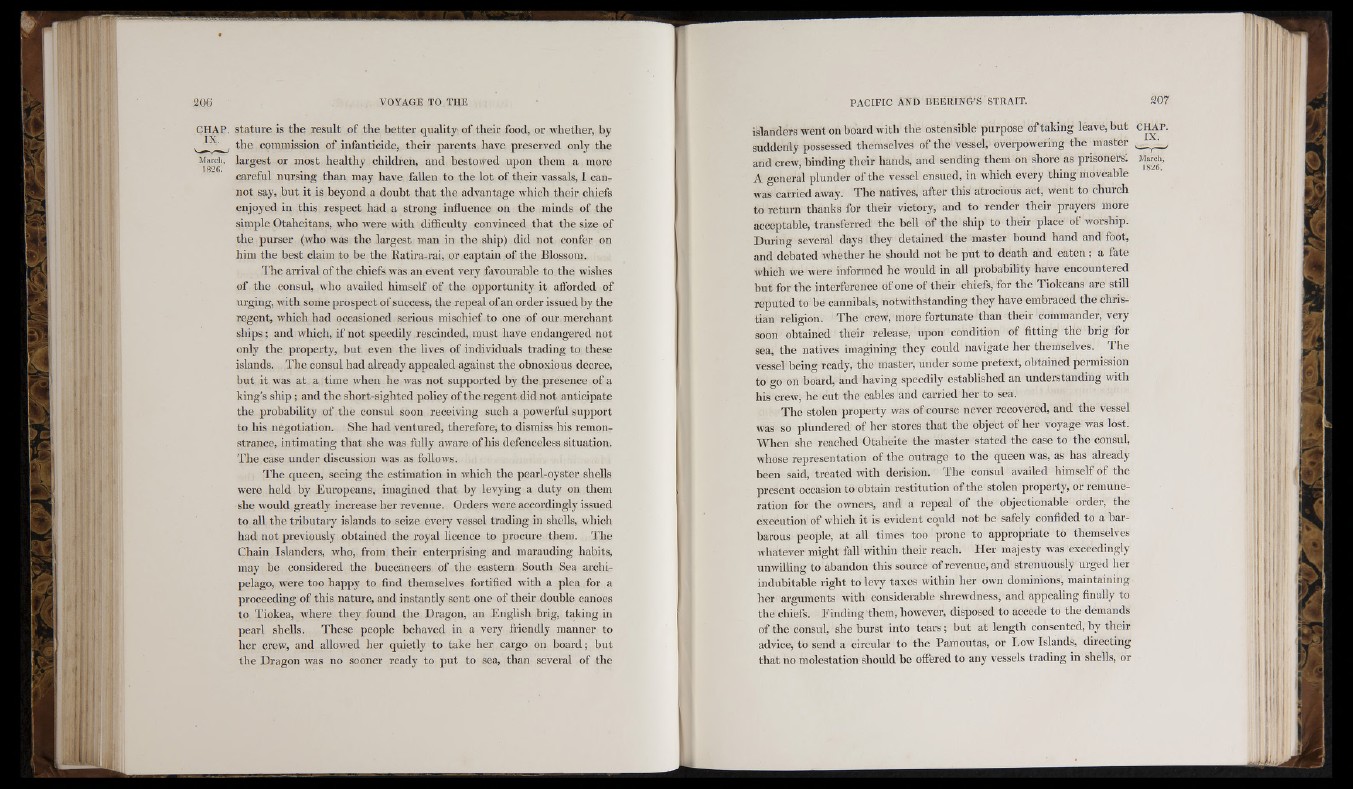
CHAP. stature is the result of the better quality of their food, or whether, by
the commission of infanticide, their parents have preserved only the
largest or most healthy children, and bestowed upon them a more
careful nursing than may have fallen to the lot of their vassals, 1 cannot
say, but it is beyond a doubt that the advantage which their chiefs
enjoyed in this respect had a strong influence on the minds of the
simple Otaheitans, who were with difficulty convinced that the size of
the purser (who ivas the largest man in the ship) did not confer on
him the best claim to be the Ivatira-rai, or captain of the Blossom.
The arrival of the chiefs w'as an event very favourable to the wishes
of the consul, who availed himself of the opportunity it aflbrded of
urging, with some prospect of success, the repeal of an order issued by the
regent, which had occasioned serious mischief to one of our merchant
ships ; and which, if not speedily rescinded, must have endangered not
only the property, but even the lives of individuals trading to these
islands. The consul had already appealed against the obnoxious decree,
but it was at a time when he was not supported by the presence of a
king’s ship ; and the short-sighted policy of the regent did not anticipate
the probability of the consul soon receiving such a powerful support
to his negotiation. She had ventured, therefore, to dismiss his remonstrance,
intimating that she was fully aware of his defenceless situation.
The case under discussion was as follows.
The queen, seeing the estimation in which the pearl-oyster shells
were held by Europeans, imagined that by levying a duty on them
she would greatly increase her revenue. Orders were accordingly issued
to all the tributary islands to seize every vessel trading in shells, which
had not previously obtained the royal licence to procure them. The
Chain Islanders, who, from their enterprising and marauding habits,
may be considered the buccaneers of the eastern South Sea archipelago,
were too happy to find tliemselves fortified with a plea for a
proceeding of this nature, and instantly sent one of their double canoes
to Tiokea, where they found tlie Dragon, an English brig, taking in
pearl shells. These people behaved in a very friendly manner to
her crew, and allow'ed her quietly to take her cargo on board; but
the Dragon was no sooner ready to put to sea, than several of the
islanders went on board with the ostensible purpose of taking leave, but C H A P .
suddenly possessed themselves of the vessel, overpowering the master .__ ^
and crew, binding their hands, and sending them on shore as prisoners: March,
A general plunder of the vessel ensued, in which every thing moveable
was carried away. The natives, after this atrocious act, went to church
to return thanks for their victory, and to render their prayers more
acceptable, transferred the bell of the ship to their place of worship.
During several days they detained the master bound hand and foot,
and debated whether he should not be put to death and eaten ; a fate
which W'e were informed he would in all probability have encountered
but for the interference of one of their chiefs, for the Tiokeans are still
reputed to be cannibals, notwithstanding they have embraced the Christian
religion. The crew, more fortunate than their commander, very
soon obtained their release, upon condition of fitting the brig for
sea, the natives imagining they could navigate her themselves. The
vessel being ready, the master, under some pretext, obtained permission
to go on board, and having speedily established an understanding w'ith
his crew, he cut the cables and carried her to sea.
The stolen property was of course never recovered, and the vessel
was so plundered of her stores that the object of her voyage was lost.
When she reached Otaheite the master stated the case to the consul,
whose representation of the outrage to the queen was, as has already
been said, treated with derision. The consul availed himself of the
present occasion to obtain restitution of the stolen property, or remuneration
for the owners, and a repeal of the objectionable order, the
execution of which it is evident could not be safely confided to a barbarous
people, at all times too prone to appropriate to themselves
whatever might fall within their reach. Her majesty w'as exceedingly
unwilling to abandon tliis source of revenue, and strenuously urged her
indubitable right to levy taxes within her own dominions, maintaining
her arguments with considerable shrewdness, and appealing finally to
the chiefs. Finding them, however, disposed to accede to the demands
of the consul, she burst into tears ; but at length consented, by their
advice, to send a circular to the Bamoutas, or Low' Islands, directing
that no molestation should be offered to any vessels trading in shells, or
' I l i
i l |.ì